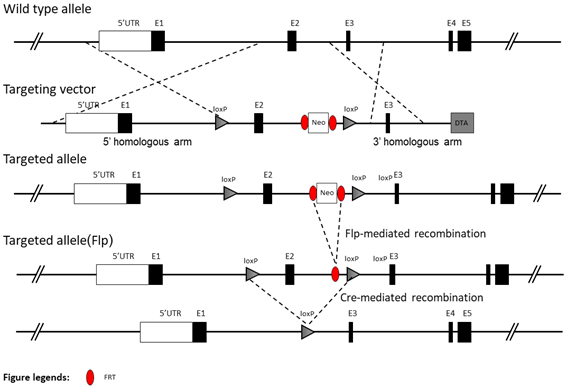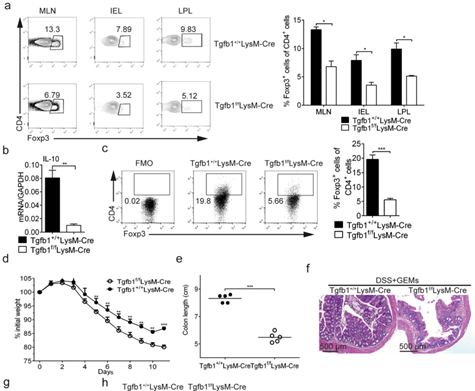| Strain Name |
C57BL/6-Tgfb1tm1Bcgen/Bcgen |
Stock No. | 110164 |
| Common name |
B-Tgfb1 cKO mice |
Gene symbol and name | Tgfb1(transforming growth factor, beta 1), Tgfb |
| Strain of origin |
C57BL/6 |
Chromosome | 7 |
| Coat color | Black | Dietary information | Growth and reproduction diet for experimental mice |
|
NCBI Gene ID |
21803 | ||
Application
- Function research of genes
- This Tgfb1CKO model is an efficient tool to study the Tgfb1 gene functions in various tissue and cells when crossed with different tissue and cell specific Cre expressing mice.
Gene editing strategy

A designed targeting vector containing 5’-homologous arm, loxP-Exon2-frt-Neo-frt-loxP, 3’-homologous arm, and DTA selection marker was introduced into C57BL/6 ES cells, replacing corresponding Tgfb1 exon 2 locus. The resulting chimeric animals were crossed to C57BL/6 mice to establish the colony.
Phenotype Analysis

TGFb1 produced by myeloid cells is required for GEMsmediated immunomodulation. Tgfb1f/fLysM-Cre and Tgfb1+/+LysMCre mice were gavaged with GEMs before the subsequent experiment.a Flow cytometry analysis of Foxp3 expression in CD4+ T cells in the MLN, IEL, and LPL. Bar graph shows data from three experiments combined. b RNA was extracted from the small intestines of indicated mice, and the expression level of IL-10 was assayed by qRT-PCR. c CD11c+ DCs were purified from the MLNs of GEM-treated Tgfb1f/fLysM-Cre and Tgfb1+/+LysM-Cre mice and incubated with naïve CD4+ T cells in Treg-polarizing condition. Numbers indicate the percentages of CD4+Foxp3+ T cells after 4 days co-culture. Bar graph shows data from three experiments combined. d–f Tgfb1f/fLysM-Cre and Tgfb1+/+LysMCre mice were gavaged with GEMs before DSS administration. d Body weight. e Colons length. f Representative images of H&E staining. g Tgfb1f/fLysM-Cre and Tgfb1+/+LysM-Cre mice were treated with GEMs before H. felis administration. Colonization of H. felis in the gastric tissue was measured by qRT-PCR.
(source: Zeng Z et al.,2019)
Reference
1. Shull MM; Ormsby I; Kier AB; Pawlowski S; Diebold RJ; Yin M;
Allen R; Sidman C; Proetzel G; Calvin D; Annunziata N; Doetschman T. 1992.
Targeted disruption of the mouse transforming growth factor-beta 1 gene results
in multifocal inflammatory disease. Nature 359(6397):693-9. [PMID: 1436033]
2. Boivin GP; O'Toole BA; Orsmby IE; Diebold
RJ; Eis MJ; Doetschman T; Kier AB. 1995. Onset and progression of pathological
lesions in transforming growth factor-beta 1-deficient mice. Am J Pathol
146(1):276-88. [PMID: 7856734]
3. Engle SJ; Ormsby I; Pawlowski S; Boivin
GP; Croft J; Balish E; Doetschman T. 2002. Elimination of Colon Cancer in
Germ-free Transforming Growth Factor Beta 1-deficient Mice. Cancer Res
62(22):6362-6. [PMID: 12438215]









